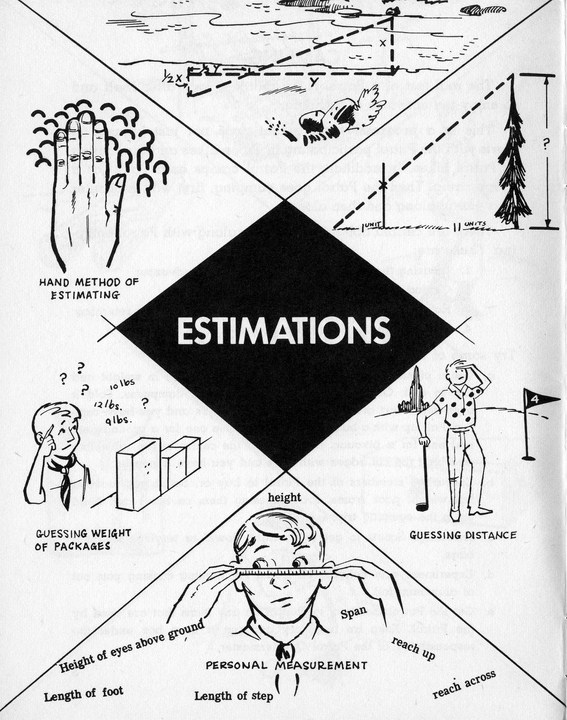 Why estimate - why not, just guess? Well, an estimation has been described as
an educated guess. This means that accuracy has improved with practice. Suppose
you wanted to fell a tree across a stream for a bridge. How high is the tree and
how wide is the stream? Knowing these answers you could determine if the tree
would do the job. Start with personal measurements. Have each member of your
Patrol become familiar with the list in Tenderfoot to Queen's Scout.
Why estimate - why not, just guess? Well, an estimation has been described as
an educated guess. This means that accuracy has improved with practice. Suppose
you wanted to fell a tree across a stream for a bridge. How high is the tree and
how wide is the stream? Knowing these answers you could determine if the tree
would do the job. Start with personal measurements. Have each member of your
Patrol become familiar with the list in Tenderfoot to Queen's Scout.
Let's look at that tree again. How many methods of checking can your Patrol do? Pencil method? Shadow method? Napoleon method? Lumberman's method? One-in-twelve method?
Don't restrict yourself to trees! Try towers, poles, cliffs, buildings and steeples. Set up a course with 5 or 6 objects. Have each Scout estimate height. Then, as a Patrol, check them by one of the methods mentioned above.
Use the same idea for rivers, fields, fairways, roads, rooms, etc. On a Patrol hike, try to estimate distances before covering them. This is good practice for keeping logs on First Class hikes.
Ever wonder how many people are in a crowd? Try covering an area with your hand fully outstretched. Estimate or count the number in this area. Multiply by the number of portions required to fill in the whole crowd. Practise with numbers of stones, beans, etc. Make a game of it.
Estimating weights can also be fun. Ever see the man at the fair? He is usually accurate to well within the 10% allowed in estimations. This, again, is done by practice. Get your parents or leaders to set up a group of similar-sized packages of various weights. Run a competition for the Patrol. Best estimator to get the contents of one - nuts or candies.
Remember - the difference between a "guesstimation" and an "estimation" is practice.